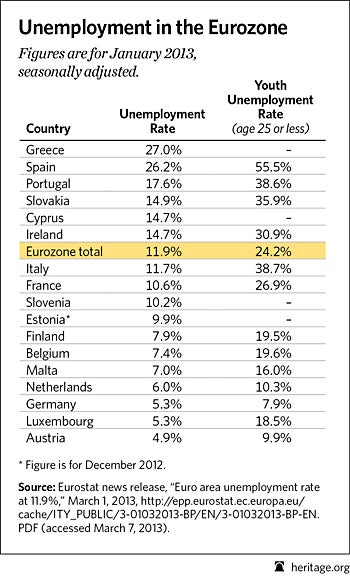January’s unemployment numbers for the 17 countries of the eurozone has moved closer to 12 percent. This underscores the strong economic headwinds that face these member nations as they continue to grapple with an ongoing economic crisis.
This same data reveals deep internal chasms within the eurozone between the economically healthy member nations and those with more serious economic challenges. Greece has an unemployment rate of 27 percent and Spain is at 26.2 percent, compared to European economic engine Germany, which has an unemployment rate of only 5.3 percent.
The persistence of the unemployment problem within the eurozone is part of the reason why European voters and some governments are rethinking calls for closer economic and political integration centered in Brussels. As Heritage’s Nile Gardiner explains:
The financial and economic crisis enveloping the eurozone has exposed the fundamental flaws of the European Project. For several decades, the European Union (EU) has pursued an “ever closer union”—a growing centralization of economic and political power with little concern for economic freedom, national sovereignty, and democratic accountability.
It should come as no surprise that the eurozone nations which enjoy the greatest amount of economic freedom also tend to have the lowest unemployment rates and the strongest economies. According to The Heritage Foundation’s 2013 Index of Economic Freedom, Greece ranks the lowest of all the eurozone nations in the Index and is categorized as “Mostly Unfree,” whereas Austria, Germany, and Luxembourg rank as “Mostly Free.”
It remains unclear how rigidly eurozone governments will stick with austerity measures, especially facing street protests and voter wrath at the polls. What is clear, where data is available, is that the youth in the eurozone have been disproportionately impacted by unemployment. Even in countries like Austria and Germany, which have low unemployment rates, youth unemployment is significantly higher, although nowhere near as high as the staggering 55.5 percent youth unemployment rate in Spain.
High youth unemployment not only makes violent protests against austerity measures more likely, it will have a negative impact on the long-term competitiveness of the affected economies. Young workers that are not acquiring the work experience and skills needed to compete in a global marketplace may find themselves falling further and further behind and into greater and greater debt.
The policies of an ever closer union in the eurozone have not helped in bringing down unemployment, which is another key reason why Euroskeptics will continue to gain ground across Europe.





























